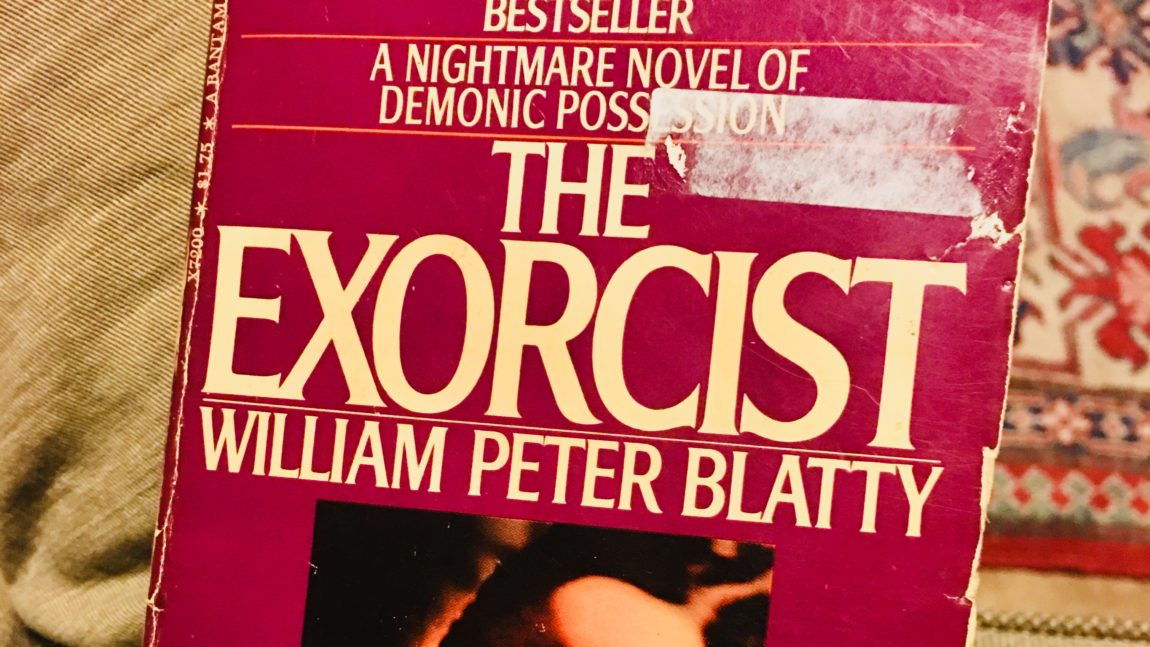Find a good 1970’s copy of The Exorcist. One with yellowed and musty pages. To resurrect the flavor of authentic literary horror. My copy was published in 1974, gently read. The spine unbroken, unspoiled. Flipping the pages stirs the mustiness of forgotten evil, and the sharp story telling of the waning art of the master novelist.
(We will not review the story here. If you don’t know what The Exorcist is about, then you’ve probably just returned from a 50-year Jesuit retreat in the Swiss Alps and have never heard of the Internet, Star Wars, iPhones, Space X, or Walkmans for that matter. Can’t help you.)
The Exorcist is something much more than green vomit and demonic heads making 365 degree turns. The movie was ground breaking in terms of a cinematic horror mile stone. But William Peter Blatty expertly invited us into the lives of characters we can understand, convinced us with fully developed characters and well-drawn backgrounds and religious and occultist details, that this is something that may have actually happened, or worse, could happen. Hopefully, to someone else.
And there lies one of the deeper messages of this story, which is something more than the puke and blasphemous profanity most remember from the movie. Blatty’s exorcist, Father Merrin, speaking to Father Karras, says, “Yes I think the demon’s target is not the possessed; it is us … the observers … every person in this house. And I think – I think the point is to make us despair; to reject our own humanity, Damien: to see ourselves as ultimately beastial; as ultimately vile and putrescent; without dignity; ugly; unworthy. And there lies the heart of it, perhaps: in unworthiness.” Blatty seems to speak to use directly toward the climax:
“Ah, well … at last I realized that God would never ask of me that which I know to be psychologically impossible; that the love which He asked was in my will and not meant to be felt as emotion at all. Not at all. He was asking that I act with love; that I do unto others; and that I do it unto those who repelled me. I believe, as a greater act of love than any other.” He shook his head. “I know that all of this must seem very obvious, Damien. I know. But at the time I could not see it. Strange blindness. … “There is lies, I think, Damien … possession; not in wars, as some tend to believe; not so much; and very seldom in extraordinary interventions such as here … this girl … this poor child. No, I see it most often in the little things, Damien: in the senseless, petty spites that leaps unbidden to the tongue between friends. Between lovers. Enough of these,” Merrin whispered, “and we have not need of Satan to manage our wars; these we manage for ourselves … for ourselves …”
And so, one of the central messages of The Exorcist may be a testimony as to how the small things can make huge differences, for evil or good. Do small deeds for others, even if it can be difficult to fully feel the weight of your actions. For likewise, the small careless things we do can have catastrophic effects on others, even comparable to the worst demon possession, if a bad seed is allowed to take root from it, then sometimes evil deeds against individuals can have a more terrible impact. Yes, there is meaning in The Exorcist, for good.
Just as true: there is very excellent storytelling and writing in The Exorcist. Blatty draws us un slowly and carefully, developing each character into someone we can imaging knowing. Our likes and dislike, our cheers and criticisms, of each character, are heartfelt, as though we’re watching things play out as a fly on the wall, which makes the scary parts all the more unsettling.
After reading this book, for the first time, I can see why generations had to endure decades of documentaries, sequels, and endless demonic possession movies, most of them failing to live up to this original work. More unfortunately, it seems, few seem to comprehend and lampoon the aforementioned positive message of The Exorcist.
If you’re looking for a sure-thing good read, then pick up The Exorcist. You shall not be disappointed; though you may lose a little sleep, whether for being horrified or simply unable to put down a good story, depends on you.
Review by Austin Reams
Copyright (c) 2018 Austin Reams




Add Comment